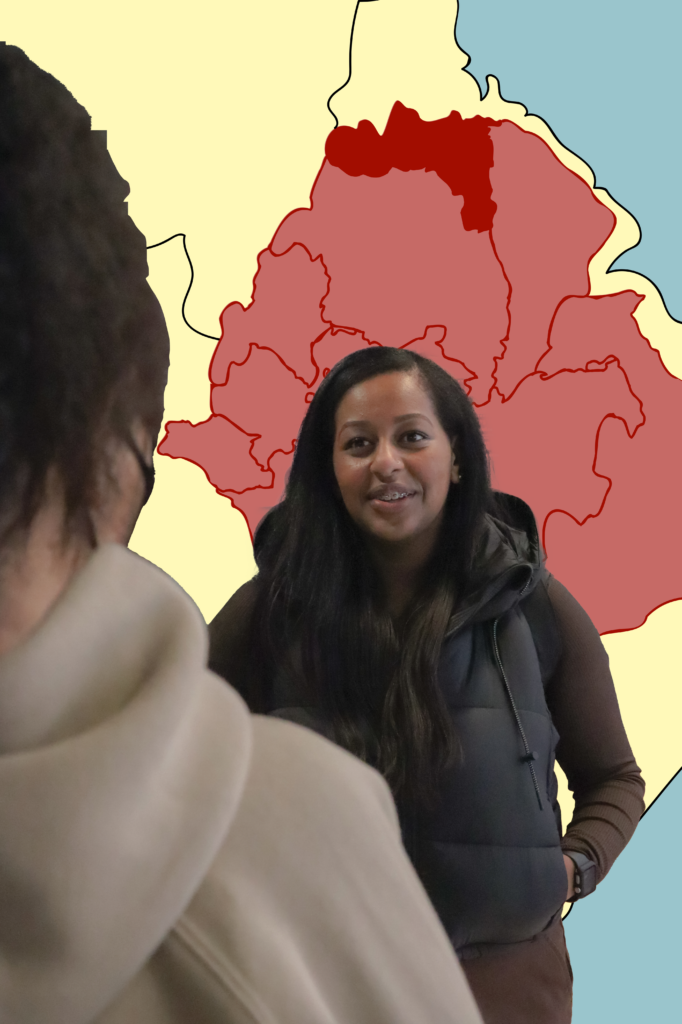
This March marked the one year anniversary of the first safe space hosted by the Ryerson school of journalism. Since then, there have been a number of safe spaces hosted in collaboration with students, the most recent one being the safe space for students affected by Russia’s invasion of Ukraine.
The safe spaces were created after a call to action from students and staff for more support and conversations around world issues that affect the student body. “These safe spaces were created because there’s a lot that our students are dealing with, that we’re dealing with and are continuing to deal with,” said Asmaa Malik, interim co-chair of the school of journalism.
The first safe space, in March 2021, was led by Adrian Ma, assistant professor and Anita Li, a contract instructor in the school of journalism, following the rise of violence against people of Asian descent in North America. “These incidents were really affecting our students, because you know, how do you report on this kind of stuff? At the same point, how do you process it as a person who might be encountering it,” said Sonya Fatah, assistant professor at the school of journalism.
Malik and Fatah were both instrumental in organizing and putting together these safe spaces for students. “Many of the faculty members were feeling that there was a need to create more spaces for students to be able to include different perspectives in the program,” said Fatah.
In June 2021, the school of journalism hosted a safe space for students who had connections to the war in Tigray, Ethiopia. This came after multiple concerns were brought up about the lack of media coverage relating to the war and students feeling as though nobody cared. I was part of that conversation and I helped organize the safe space.
War in Ethiopia
In November 2020, Ethiopian Prime Minister Abiy Ahmed, waged a war against the Tigray People’s Liberation Front (TPLF), the ruling party in Tigray. In a recent report released by Jan Nyssen of Ghent University in Belgium, it is estimated that over 500,000 people have died from starvation and famine and more than two million people in the region have been displaced, with many fleeing to neighbouring countries.
In addition, tension has been heightened between those who identify as Tigrayan and those who are Ethiopian and Eritrean. This is a result of the Ethiopian government inviting the Eritrean military into Tigray to help them fight against the TPLF. There have been numerous credible reports of the Ethiopian and Eritrean military committing heinous sexual crimes against the people of Tigray.
For the last 18 months, those with family members and connections in the region have watched as the world turned a blind eye to their loved ones who were suffering. “There’s literally a war going on and so many people are dying and people here don’t even know about it,” said Bana Yirgalem, a second-year journalism student at Ryerson University.
Safe space
In May 2021, Yirgalem attended a journalism student council meeting where she raised her concerns about the lack of support and discussion around the war. “The school was hosting safe spaces for so many communities and I feel like the least we could do was host a safe space for people affected by this war,” said Yirgalem.
Yirgalem, who identifies as an Eritrean-Canadian, says that regardless of her identity, she felt like something had to be done. “We’re all still intertwined no matter what, so it made me feel so bad to think that I get to live in a country like Canada while there’s innocent men, women and children being killed by the government (in Tigray),” said Yirgalem.
Around the same time, I had sent an email to the interim co-chairs of the school of journalism, asking them to acknowledge the situation in Tigray and host a safe space. “I think it’s very important for students to bring up these issues and put these things on our radar so we know how to better support you,” reflects Malik.
Malik then put me in contact with Fatah. Fatah had already been in contact with Yirgalem about the possibility of hosting a safe space. “After the council meeting, Sonya got in contact with me and we set up a time for us to discuss what this space would look like,” said Yirgalem.
After two meetings with Yirgalem and Fatah, we put together an email to send out to students, inviting those from Tigray, Eritrea and Ethiopia who wanted to talk about their experience and connection to the war, in a safe environment. “Normally, with safe spaces, we only open it up to journalism students but with this safe space, we made it possible for all FCAD (Creative School) students to join,” said Fatah.
Along with the announcement, a form was sent out for students to fill out if they wanted to join the space. We wanted to get a sense of who was interested in joining. “We really opened it up to anybody, it didn’t matter if you were Ethiopian or Eritrean, the assumption was that if you attended the safe space, regardless of where you are from, you were coming to it because of your deep sense of grief towards what was happening,” said Fatah.
This was true. We had both Tigrayan and Eritrean students in attendance. Even though the safe space consisted of only four students, all of us were able to come together in this shared space and empathize with one another and lean on each other for support. “The goal there was just to create a space for people to come in and share what they are experiencing and feeling,” added Fatah.
There were also a number of students who reached out and said they couldn’t make it to the event but were extremely touched that the school was hosting one. “When I brought up this idea, I wasn’t even sure how big the Eritrean, Tigrayan or Ethiopian community at our school was, but I was just like, I feel like we should still do it no matter how big or how small it’s going to be,” said Yirgalem.
Malik says the school of journalism is working towards finding a way to maintain these safe spaces. “I think that the challenge has been, how can we do this more collaboratively in a sustainable way that will help students and students can rely on it?” said Malik. She hopes that once the new chair of the school of journalism joins in July, they will be able to discuss this plan further.
“I feel like (the school of journalism) needs to push for more safe spaces, because sometimes students don’t feel comfortable talking about things like this at home and they want to come together and discuss their feelings,” said Yirgalem.
She said she hopes the school continues to address the needs of students by making a concerted effort to ensure that these spaces are available whenever they are needed.
Ruby Asgedome was a General Assignment Reporter and Social Media Producer for On the Record for the Winter 2022 semester.

